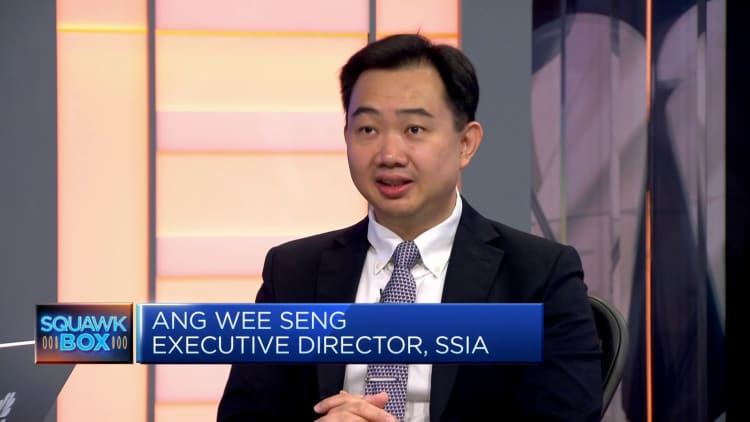Vistors to Marina Bay walk on a bridge with a view of the Central Business District in Singapore on Sunday, 18 June 2023. (Photo by Joseph Nair/NurPhoto via Getty Images) (Photo by Joseph Nair/NurPhoto via Getty Images)
Joseph Nair | Nurphoto | Getty Images
SINGAPORE — Singapore’s digital economy contributed to more than 17% of its gross domestic product in 2022 — higher than the 13% logged in 2017, according to a report by the country’s Infocomm Media Development Authority.
The study, published Friday, revealed that the economic contribution of the digital economy to Singapore’s GDP nearly doubled to 106 billion Singapore dollars ($77.5 billion) in 2022, up from SG$58 billion in 2017, according to CNBC’s calculations.
The digital economy is divided into two parts: the information and communications sector; and digitalization in the rest of the economy.
One-third of the digital economy was driven by the information and communications sector and two-thirds by digitalization in the rest of the economy.
The I&C sector drove digitalization providing services such as telecommunications, computer programming & IT consultancy, cloud computing and software development.
Digitalization in the rest of the economy measures the value generated from investments and spending in digital capital across all sectors excluding those from the I&C sector. They include economic outcomes as a result of firms investing in digital technologies that build value such as reach customers better, optimize business processes as well as innovate products and services.
“The expansion of the digital economy has come on the back of increasing adoption of digital technologies by enterprises, which in turn contributed to the robust growth of tech manpower,” IMDA said in the report.
Based on the latest available data, the digital economies of Estonia, Sweden and the United Kingdom accounted for 16.6%, 15% and 16.1% of their respective GDPs in 2020. Comparatively, Singapore’s digital economy performed better, contributing to 16.7% of its GDP in 2020.

The key sub-sectors driving double-digit growth in the information and communications sector — at a rate of as high as 70% — were games, online services, and e-commerce, according to IMDA. They were driven by increased adoption during the Covid-19 pandemic.
The value-add from digitalization in the rest of the economy increased from SG$38.6 billion in 2017 to SG$72.8 billion in 2022, driven mainly by sectors in finance and insurance, wholesale trade, and manufacturing.
As a result, the value-add from digitalization as a share of the economy rose steadily from 8.7% in 2017 to 11.9% in 2022, the report said.
This is equivalent to an annual compound growth rate of 13.5%, which is faster than the 3.8% growth of Singapore’s GDP in 2022. CAGR is a measure of investment returns, which takes into account what an investment yields at an annual rate over a specified period.
More firms using digital technologies
The growth of digitalization in the rest of the economy is driven by more firms stepping up on their use of digital technologies.
The technology adoption rate of businesses grew from 74% in 2018 to 94% in 2022, according to IMDA’s annual survey.
As a result, more tech professionals were deployed across all sectors, with the number of tech jobs growing from about 155,500 in 2017 to 201,100 in 2022.
“Despite the recent tech sector lay-offs, the demand for tech jobs is likely to remain resilient, as the digitalization of the economy deepens,” said IMDA.
“Overall, Singapore’s digital economy has been growing strongly and its longer-term outlook remains positive. The Singapore government continues to be committed to growing a competitive digital economy and fostering a technology-skilled workforce,” said IMDA.
Deputy Prime Minister Lawrence Wong said in his budget proposal for 2022 that the government will invest SG$200 million over the next few years into projects that build digital capabilities in businesses and workers.






